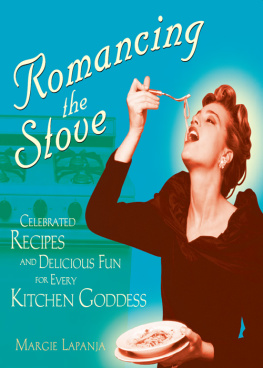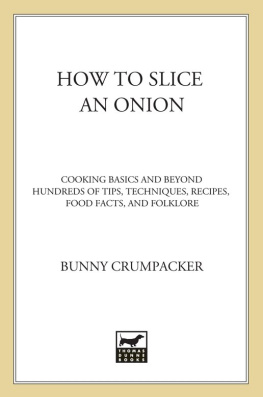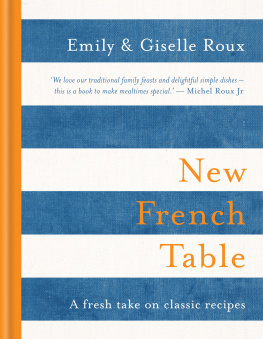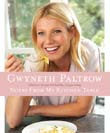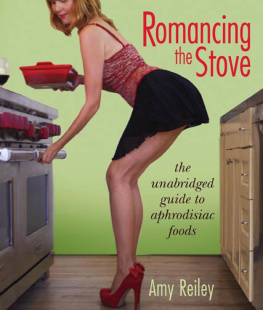
Copyright 1998, 2002 by Margaret Beiser Lapanja.
All Rights Reserved. No part of this book may be used or reproduced in any manner whatsoever without written permission, except in the case of brief quotations in critical articles or reviews. For information, contact Conari Press, an imprint of Red Wheel/Weiser, LLC, P.O. Box 612, York Beach, ME 03910-0612.
ISBN: 1-57324-858-4
Cover Design: Maxine Ressler
Cover Photography: C Squared Studios/PictureQuest,
Renzo Mancini/Getty Images
This has been previously cataloged by the Library of Congress under this title
Lapanja, Margaret Beiser,
Goddess in the kitchen: 201 heavenly recipes, spirited stories & saucy secrets / by Margie Lapanja.
p. cm.
Includes index.
ISBN 1-57324-115-6
1. Cookery. I. Title.
TX714.L345
1998
641.5dc21
98-4612
Printed in the United States of America on recycled paper.
02 03 04 05 TC 10 9 8 7 6 5 4 3 2 1
www.redwheelweiser.com
www.redwheelweiser.com/newsletter
TO
DORISMARIE WELCHER
QUEEN OF THE HUDSON
COLORFUL GODDESS, ZESTY MENTOR, AND
QUINTESSENTIAL FRIEND, WHO TAUGHT ME THIS:
BELIEVE AND RECEIVE;
DOUBT AND LOSE OUT.
Life is a glorious banquet, a limitless and delicious buffet.
MAYA ANGELOU
Contents
Chapter 1
Good Goddess, Let's Eat! The Kitchen Goddess Manifesto
Chapter 2
Demeter's Delights: Heartwarming Treasures for the Kid in All of Us
Chapter 3
In Aphrodite's Mixing Bowl: Delicious Pleasures and Tasty Favorites
Chapter 4
Making Life a Picnic: Feel-Good Feasts at Nature's Table
Chapter 5
Vestal Pleasures: Food for Savoring Solitude
Chapter 6
The Artemis Party: Fun Fare for Festive Occasions
Chapter 7
Charmed Holidays: Celebrations for a Spell
Chapter 8
The Golden Apple Invitational
Foreword
W hen is the last time you picked up a cookbook and actually read it from cover to cover? I don't mean skimmed some recipes, I mean really read a cookbook? For me, it had been a long while until I encountered Margie Lapanja's Romancing the Stove. It is one of the few modern cookery books that I actually readand relishedfrom beginning to end. In fact, I read it twice. My initial reason for reading the entire book was to immerse myself in the stories, commentary and pithy quotes. As a culinary historian, I must admit that I was looking for historical fallacies and errors. Foiled in this initial quest, I found that I enjoyed her chatty, informal, conversational style. Her playful, sensual, lightly-historical approach is a delight. This cookbook is filled with enchanting commentary and wonderful stories, along with recipes that would please the goddesses (and gods).
Margie Lapanja's selection of pithy quotes is gleaned from a wide variety of sourcesthe Bible, Chinese, Irish and Italian proverbs to Shakespeare and Moliere, and from Goethe, Blake, Twain and Emerson to Michael Jordan and Toni Morrison. (If you don't recognize all the people she quotesdon't worry, neither did I.) Sage snippets of wisdom are laced with witty interludes of that old-time, down-to-earth Midwestern good sense and sensibility. At the other end of the intellectual spectrum is the practical culinary advice that I will surely use when the need arises. All in all, this is a fun-filled book packed with unexpected gastronomical pleasures.
While Romancing the Stove's approach to modern cookbook writing may appear a bit unusual, it falls well within the traditions of the art form. Since the first cookbook, Platina's De honesta voluptate (in case your Latin is rusty, this is translated Concerning Honest Pleasure), was published in Venice in 1475 cookbooks have been closely associated with sensual pleasures, ancient Greek and Roman gods and goddesses, as well as culinary delights and good recipes. All pleasures were connected, and gastronomical pleasures were no exceptions. Of course, during the Renaissance few cooks could read, and so the culinary works were really aimed at the literate, upperclass elite.
During the centuries that followed, the cookbook field went in three directions. One direction was geared toward the professionalization of cookery. These cookbooks were written by the professional chef for professional chefs. Mainly written by French and Italian masters, such as Bartolomeo Scappi's and Pierre Franois de la Varenne's works, these cookbooks stand today as exemplars of culinary masterpieces much as do the works art of Michelangelo or Leonardo da Vinci. Alas, this golden age of literary cookbooks was not to last.
The second direction was exemplified by cookbooks written by men telling women what to do in the kitchen. Their comments about women and women's roles in life were highly influenced by Puritanical values which today can be relegated to the historical dustbin. Their recipes are most interesting as little evidence suggests that few of these authors ever made it into the kitchen themselves to test out their proposed instructions.
The third direction was toward the practical guidance based on rich experience gained in the kitchen. Not surprisingly, these were written mainly by women. Some of the best cookbooks ever written fall into this category, such as Hannah Glasse's The Art of Cookery (London, 1747) and Mary Randolph's The Virginia Housewife (Washington, 1824).
Somewhere in the late nineteenth century, the art of cookery turned into a pseudoscience, consisting of a compilation of chemistry-like formulae filled with ingredients, weights, measures, temperatures, vitamins, proteins, carbohydrates and durations. Cookbooks also tended to become much simpler, because the authors themselves were not cooks. The writers, best exemplified by Fannie Farmer's Boston Cooking-School Cook Book (Boston, 1896), assumed that their target reader did not know how to cook, but could follow simple laboratory-like directions.
With the scientific and simplistic approaches ensconced in the kitchen, all other distractions disappeared from cookbooks. Literary references were removed; comments about life excluded; and the sensual connections were banned. Sadly, one of the distractions was the fun of cookery and of cookbook writing.
Margie Lapanja's Romancing the Stove successfully combines a variety of elements of cookbooks of the past. She demonstrates the qualities of the professional chef and offers excellent cooking tips. She reintroduces the ancient philosophical wisdom and modern culinary insight. Unlike the earlier cookbook authors who were completely serious about their references to the geniuses of the past, Margie Lapanja weaves them into the text with joy and lightheartedness. This contrasts with many of our predispositions, in the face of harried modern life, that cookery is a boring drudgery and a necessary evil. Putting the playfulness back into cooking is one of the book's most charming messages.
It was only after I read the book the first time that I went back to peruse the recipes carefully. These heavenly creations appeared to merit attention in their own right. But titillating titles and incredible ingredients do not necessarily a good recipe make. Now, let me be honest: in the kitchen, no goddess am I. Although I have been known to dabble a bit in the kitchen, by no stretch of the imagination am I a great cook. However, spirited with Margie Lapanja's recipes, I imagined myself in the kitchen with the goddesses Demeter, Artemis and Aphrodite and explored several of the dishes. Of course, as a true tomato lover, I had to try Love Apple Linguini, which was as good as I anticipated. I noshed on Norwegian Oatmeal Waffles, munched Mandarin Spinach Salad, chomped on Curry Sweet Potatoes with Chicken Apple Sausage, and nibbled on Magic Double Fudge Brownies. (As a brownie afficionado I rate this last recipe as one of the finer examples of the art.) I'm looking forward to exploring them all.
Next page
